
-
 England captain Itoje savours 'special' New Zealand win
England captain Itoje savours 'special' New Zealand win
-
Wales's Evans denies Japan historic win with last-gasp penalty

-
 Zelensky renews calls for more air defence after deadly strike on Kyiv
Zelensky renews calls for more air defence after deadly strike on Kyiv
-
NBA's struggling Pelicans sack coach Willie Green

-
 Petain tribute comments raise 'revisionist' storm in France
Petain tribute comments raise 'revisionist' storm in France
-
Spain on World Cup brink as Belgium also made to wait

-
 Spain virtually seal World Cup qualification in Georgia romp
Spain virtually seal World Cup qualification in Georgia romp
-
M23, DR Congo sign new peace roadmap in Doha

-
 Estevao, Casemiro on target for Brazil in Senegal win
Estevao, Casemiro on target for Brazil in Senegal win
-
Ford steers England to rare win over New Zealand

-
 Massive march in Brazil marks first big UN climate protest in years
Massive march in Brazil marks first big UN climate protest in years
-
Spain rescues hundreds of exotic animals from unlicensed shelter

-
 Huge fire sparked by explosions near Argentine capital 'contained'
Huge fire sparked by explosions near Argentine capital 'contained'
-
South Africa defy early red card to beat battling Italy

-
 Sinner beats De Minaur to reach ATP Finals title match
Sinner beats De Minaur to reach ATP Finals title match
-
Zelensky vows overhaul of Ukraine's scandal-hit energy firms

-
 South Africa defy early red card to beat Italy
South Africa defy early red card to beat Italy
-
Alex Marquez claims Valencia MotoGP sprint victory

-
 McIlroy shares lead with Race to Dubai title in sight
McIlroy shares lead with Race to Dubai title in sight
-
Climate protesters rally in Brazil at COP30 halfway mark

-
 Spike Lee gifts pope Knicks jersey as pontiff meets film stars
Spike Lee gifts pope Knicks jersey as pontiff meets film stars
-
BBC caught in crossfire of polarised political and media landscape

-
 'Happy' Shiffrin dominates in Levi slalom for 102nd World Cup win
'Happy' Shiffrin dominates in Levi slalom for 102nd World Cup win
-
Palestinian national team on 'mission' for peace in Spain visit

-
 Brazilian 'Superman' cheers child cancer patients in Ghana
Brazilian 'Superman' cheers child cancer patients in Ghana
-
India close in on win over South Africa after Jadeja heroics

-
 Huge explosions rock industrial area near Argentina's capital
Huge explosions rock industrial area near Argentina's capital
-
Bezzecchi takes pole for Valencia sprint and MotoGP

-
 Dominant Shiffrin leads after first slalom run in Levi
Dominant Shiffrin leads after first slalom run in Levi
-
Nine killed in accidental explosion at Indian Kashmir police station

-
 Climate protesters to rally at COP30's halfway mark
Climate protesters to rally at COP30's halfway mark
-
Fighting South Africa lose Rickelton after India 189 all out

-
 Harmer leads South Africa fightback as India 189 all out
Harmer leads South Africa fightback as India 189 all out
-
Prison looms for Brazil's Bolsonaro after court rejects his appeal
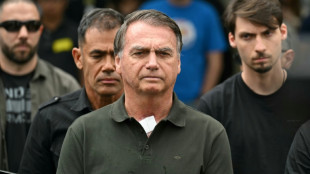
-
 EU bows to pressure on loosening AI, privacy rules
EU bows to pressure on loosening AI, privacy rules
-
India close in on lead despite South African strikes
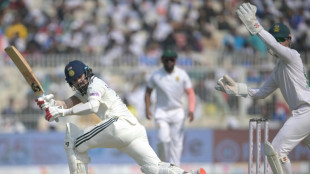
-
 Curry's 49 points propel Warriors in 109-108 win over Spurs
Curry's 49 points propel Warriors in 109-108 win over Spurs
-
NZ boxer Parker denies taking banned substance after failed test

-
 Australia setback as Hazlewood ruled out of 1st Ashes Test
Australia setback as Hazlewood ruled out of 1st Ashes Test
-
Australia pace spearhead Josh Hazlewood ruled out of 1st Ashes Test

-
 UN Security Council to vote Monday on Trump Gaza plan
UN Security Council to vote Monday on Trump Gaza plan
-
Japan's Tomono leads after men's short program at Skate America
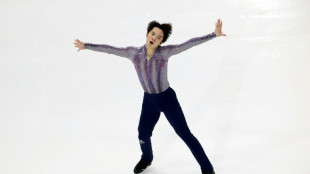
-
 China tells citizens to avoid Japan travel as Taiwan row grows
China tells citizens to avoid Japan travel as Taiwan row grows
-
Purdue Pharma to be dissolved as US judge says to approve bankruptcy
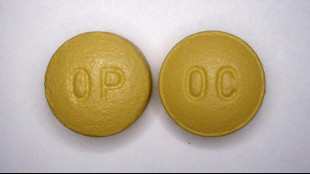
-
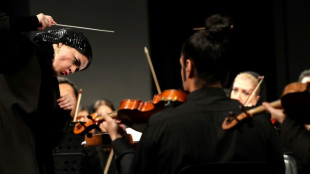 Iran's first woman orchestra conductor inspires
Iran's first woman orchestra conductor inspires
-
Wood gets all-clear in boost for England

-
 Golf's world No. 8 Thomas has back surgery
Golf's world No. 8 Thomas has back surgery
-
Rebooted Harlem museum celebrates rise of Black art

-
 'Desperation in the air': immigrant comics skewer Trump crackdown
'Desperation in the air': immigrant comics skewer Trump crackdown
-
UN regulator says shipping still wants to decarbonize -- despite US threats
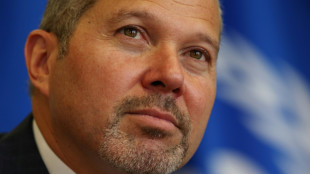

Experts point out how TV's Dr House often got it wrong
He's the maverick medic who loved to confound the medical establishment with his brilliant, unorthodox diagnoses.
But Dr Gregory House, the misanthropic genius who was the star of the long-running "House" television series, got an awful lot wrong himself, Croatian doctors claim.
From a neurologist at work on the wrong end of a patient by performing a colonoscopy, or an MRI scan done by a physician who is clearly not a radiologist, Croatian researchers have pulled the American series up on its medical accuracy in a paper published this month.
Denis Cerimagic, a professor at Dubrovnik University, and two fellow neurologists -- all big fans of the series -- listed 77 errors after analysing all 177 episodes of the show, which ran from 2004 to 2012.
"We focused on the diagnoses of main cases, reality of clinical practice presentation and detection of medical errors," Cerimagic told AFP.
He and his peers -- Goran Ivkic and Ervina Bilic -- broke the mistakes down into five categories including misuses of medical terminology, misinformation and simple weirdness -- something which the show's anti-hero, played by British star Hugh Laurie, possessed in abundance.
- That limp -
They included the use of mercury thermometers -- which had long given way to digital ones -- the term heart attack and cardiac arrest being used interchangeably when they are not the same, and that vitamin B12 deficiency can be corrected with just one injection.
Nor is there a universal chemotherapy for all types of malignant tumours, as one episode suggested.
But arguably the biggest error of all is that Laurie -- whose character's genius for deduction comes from the misdiagnosis that left him with a limp and chronic pain -- uses his cane on the wrong side.
The stick should be carried on his unaffected side, Cerimagic said, though he understood why the actor had done it because "it's more effective to see the pronounced limp on the screen".
Their research also found medical procedures being done by specialists who had no business being there, like an infectologist performing an autopsy.
At times the series also stretched reality beyond breaking point, with the findings of complex laboratory tests done in just a few hours. And doctors rarely turn detective and take it upon themselves to enter patients' homes to look for environmental causes of illnesses.
Not to mention Dr House's unethical behaviour -- "Brain tumour, she's gonna die" the paper quoted him as saying -- and the character's opiates addiction.
The researchers say they may have missed other mistakes.
"We are neurologists while other medical specialists would certainly establish additional errors," Cerimagic added.
- Medical errors -
Whatever their criticisms, the researchers say that modern medical series are far better produced than in the past, thanks to medical advisors.
It is not like some 20 years ago when you had doctors looking at X-rays upside down, the neurologist said.
"Now only medical professionals can notice errors," Cerimagic said.
Despite its flaws, they thought the series could even be used to help train medical students.
"The focus could be on recognising medical errors in the context of individual episodes, adopting the teamwork concept and a multidisciplinary approach in diagnosis and treatment," Cerimagic said.
He said he and his colleagues were taken aback by the response to their paper "House M.D.: Between reality and fiction" -- which is not the first academic study to cast doubt on the good doctor and his methods.
"The idea was to make a scientific paper interesting not only to doctors but also to people without specific medical knowledge."
J.AbuHassan--SF-PST



